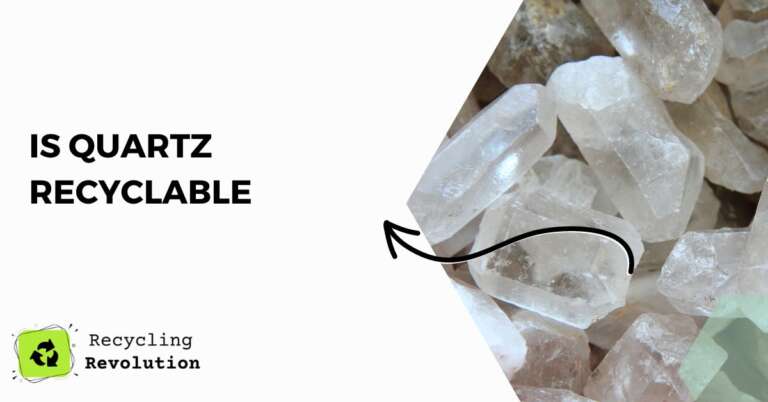Before we tackle the issue of quartz recycling, it’s essential to have a solid understanding of what quartz is. Quartz is one of the most abundant and widely distributed minerals on Earth. It’s used in numerous industries and can be found in items ranging from watches to countertops, due to its beauty and durability.
TL;DR: Quartz, despite being a highly abundant mineral, is not generally recycled due to technical constraints, as well as economic factors. However, it can be repurposed or reused in a variety of creative ways, such as in construction, landscaping, and even in crafting.
While quartz is a naturally occurring mineral, the type of quartz most of us are familiar with in our everyday lives is often engineered quartz. This is a composite material made from ground quartz, resins, and pigments. It’s beloved for its strength, low maintenance, and wide array of colors and styles.
The Recycling Challenge
Now, onto the main question: Is quartz recyclable? Here’s the honest truth – not typically. The primary challenge lies in the very nature of quartz, particularly engineered quartz. The melding of natural quartz with resins and pigments results in a product that is tough and resistant to damage, which ironically, makes it harder to recycle.
This isn’t to say that quartz recycling is impossible. However, the processes required to break down and recycle quartz are energy-intensive and often cost-prohibitive. As of my knowledge cut-off in September 2021, no widely accepted industrial processes for quartz recycling exist.
Note: While quartz may not be conventionally recyclable, this doesn’t mean it’s destined for the landfill. The possibility for reusing and repurposing quartz is extensive, offering creative and eco-friendly alternatives.
The Lifecycle of Quartz
To further comprehend why quartz isn’t typically recycled. Quartz extraction involves mining from rich deposits, often in regions like Brazil, Madagascar, and the United States.
Once extracted, the quartz undergoes a process of crushing, grading, and then blending with a binding agent, typically a form of resin, to create engineered quartz. This lifecycle contributes to the challenge of recycling quartz. The energy input required to extract, process, and manufacture quartz products is high.
Additionally, the resins used in engineered quartz can be difficult to separate from the natural quartz crystals once combined, creating a significant barrier to recycling.
Challenges in Quartz Recycling
One of the primary barriers to quartz recycling lies in the current limitations of technology. The separation of the resin from the quartz requires a high energy input. Currently, there is no cost-effective way to do this that would make quartz recycling a commercially viable option.
A secondary challenge is the potential release of harmful substances. During the quartz manufacturing process, a substance called crystalline silica is released. This poses a health risk if inhaled, causing conditions such as silicosis. This risk adds another layer of complexity to the potential recycling process.
Note: While there are numerous challenges in quartz recycling, these should not be interpreted as insurmountable. With advances in technology, the possibility of more effective quartz recycling in the future is not off the table.
Repurposing Quartz: Going Beyond the Surface
We’ve already touched on the potential for repurposing quartz in construction, landscaping, and crafts. Let’s look at these in more detail:
- Construction Material: Quartz can be crushed into smaller pieces and used as a substitute for natural stone in things like walkways, patios, or driveways. It can also be used as a component in composite decking material, giving it an elegant look.
- Landscaping: Larger pieces of quartz can serve as decorative elements in your garden. Smaller pieces can be used as a gravel substitute or to create intricate mosaic garden paths.
- Crafting and Art: The natural beauty of quartz lends itself perfectly to crafting and art. It can be used to make beautiful jewelry, incorporated into mosaic art pieces, or even ground down into a fine powder and used as a pigment.
The Power of Consumer Choices
Consumer choices play a significant role in determining the environmental impact of products. If recycling and sustainability are crucial to you, there are many other countertop materials to consider.
- Terrazzo: Terrazzo is a composite material that can be made from a variety of recycled materials such as glass, granite, or marble chips.
- Bio-Glass: This is a unique material made entirely from recycled glass. It’s not only recyclable but also adds a unique touch to your decor.
- Bamboo: Bamboo is a renewable resource that grows much faster than traditional hardwoods. It can be used to create beautiful, eco-friendly countertops.
Remember, the more demand there is for sustainable, recyclable products, the more incentive there is for companies to produce them. As a consumer, you have the power to drive change through your purchasing decisions.
Alternative Sustainable Choices
If your heart is set on more traditionally recyclable materials, consider alternatives to quartz. Numerous eco-friendly materials on the market have similar properties to quartz but come with the added benefit of being recyclable.
- Metal: Aluminum and stainless steel are both recyclable and offer a sleek, modern look.
- Glass: Recycled glass countertops are a sustainable and visually interesting alternative to quartz.
- Paper Composite: An unusual but sustainable choice, paper composite countertops are made from post-consumer recycled paper and other fibers held together with a resin.
Conclusion
While the journey towards a sustainable future often encourages recycling, the case of quartz illustrates that recycling is not always the most viable or eco-friendly option. The technical and economic barriers make quartz recycling an unfeasible choice in most cases. However, that doesn’t mean there’s no hope for your old quartz countertops or remnants.
Quartz can be creatively repurposed and reused, giving it a new lease on life. By shifting our perspective from recycling to repurposing, we can find new ways to minimize waste and work towards a more sustainable future.
Additionally, if recyclability is a critical factor for you, a plethora of sustainable alternatives to quartz are available. Remember, every choice we make impacts our planet, and every step towards sustainability counts.
FAQs
Is quartz recyclable?
While quartz is not typically recycled due to technical and economic constraints, it can be reused or repurposed.
Can quartz be reused?
Yes, quartz can be repurposed in many ways, such as construction material, landscaping, and crafting.
Are there recyclable alternatives to quartz?
Yes, alternatives like metal, recycled glass, and paper composite are recyclable and can be used instead of quartz.

